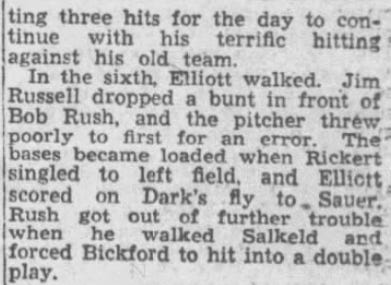The Tying Run That Wasn't
I’m really not a fan of the appeal play.
It’s confusing — especially to live spectators. You’re supposed to wait for the ball to be ruled dead, get back into position, and then make a formal appeal to the base that an opposing player missed.
It’s one of the few plays in baseball that has a sort of formality attached to it. My theory is that this formality derives from the famous howzat of cricket, which itself is often just a formality.
Sometimes, though, the appeal play really makes a difference. It sure did for a game at Wrigley Field back in 1949.
This took place on June 20, 1949. The Cubs were hosting the Boston Braves. Chicago had overcome a 2-0 deficit in the bottom of the 8th on a Hank Sauer home run. The Braves managed to eke out a 3-2 lead in the top of the 9th on an Elbie Fletcher base hit with two men out.
Frankie Gustine singled to lead off the bottom of the 9th, and went to second on a passed ball. Gene Mauch hit a fly ball to right field, allowing Gustine to go to third.
And then it happened.
Hank Edwards hit a deep fly ball that was caught in the right field corner by Marv Rickert. Gustine headed for home and was safe well ahead of the throw.
However, Eddie Stanky claimed that Gustine hadn’t tagged up in time. The Braves appealed, won the appeal, and turned a tying run into the third out.
And, as you can imagine, this caused quite a bit of concern in Chicago:
The fascinating thing for me about this story is that the three umpires that started the game were reduced to 2 before the end. I’m not certain how often that happened in 1949. It’s a pretty strong sign of how different the game was back then, however. Who’s to say that Art Gore actually saw when Gustine left?
The other fun part is seeing how different the Boston Globe story is:
Note that Clif Keane neglected to mention the umpiring situation.
While there unfortunately isn’t a picture of the controversial play, The Boston Globe did manage to print one of an earlier run:
This goes to show you how important it is to actually consult the newspapers instead of just collecting the box scores.












"It’s confusing — especially to live spectators. You’re supposed to wait for the ball to be ruled dead, get back into position, and then make a formal appeal to the base that an opposing player missed."
This is not entirely accurate. The ball does not have to be ruled dead. The third baseman in this case would just have needed to call for the ball and appeal to the umpire. And it sounds to me like that is exactly what happened.
If in attempting the appeal, the ball went out of play, e.g., into the stands or dugout, then when play was resumed, the pitcher would step off the rubber, throw to the third baseman, and the third baseman would appeal.
Now it was a long time ago, but we used to practice this when I was in high school. :)
The magic of baseball! That we can argue about an argument that happened in a game 75 years ago. And of course, the magic of tabletop baseball where we can replay that game, possibly even to the point of the argument if we happen to get the right rare play roll lol.